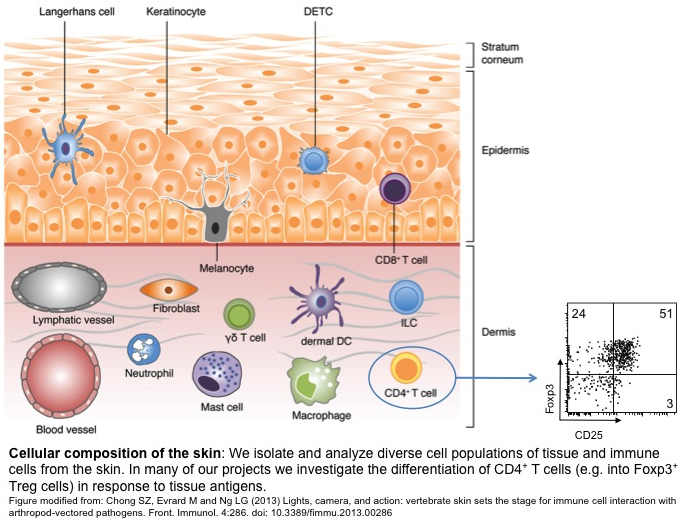
Group Iris Gratz / Gertrude Achatz: Tissue immune regulation
Division of Allergy and Immunology
Allergy and autoimmunity are chronic and debilitating conditions for which current treatment approaches are unsatisfactory. These inflammatory diseases are caused by immune cells attacking harmless (self-)antigens in host tissues, which they are supposed to protect. However, further basic research is required to fully understand the disease mechanisms and immune-regulatory processes in the target tissues.
Our research aims to elucidate the mechanisms that control the balance of immune activation versus tolerance because this balance ultimately determines the outcome and severity of disease. Understanding these mechanisms will help to develop novel therapeutic strategies.
In our studies of autoimmunity and allergy we focus on immune-regulatory processes of two major epithelial body surfaces, skin and lung.
Our main research questions are:
1. The role of Foxp3+ regulatory T cells (Treg) in inflammation, their generation and recruitment to the target tissues
2. Immune cell stability and memory formation of T and B cells with an emphasis on apoptotic processes and their regulation by cytokines
3. Studies of human immune responses in clinical settings such as gene therapy
4. Function of human skin resident T cells in tissue regeneration

In our projects we study cellular processes of T and B cell differentiation, memory formation, and IgE-regulation. For these studies we use innovative mouse models and humanized mice, which we manipulate with genetic and biomolecular tools. We combine the use of these transgenic and knock-out mice with the application of biologics, antibodies and small molecules to manipulate immune cells in vivo.
In all of our approaches we focus not only on the phenotypes of selected lineages but also on the crosstalk between immune cells of the innate and adaptive immune system as well as tissue cells.
Iris Gratz is a member of the international “PhD Program ICA” from the FWF





